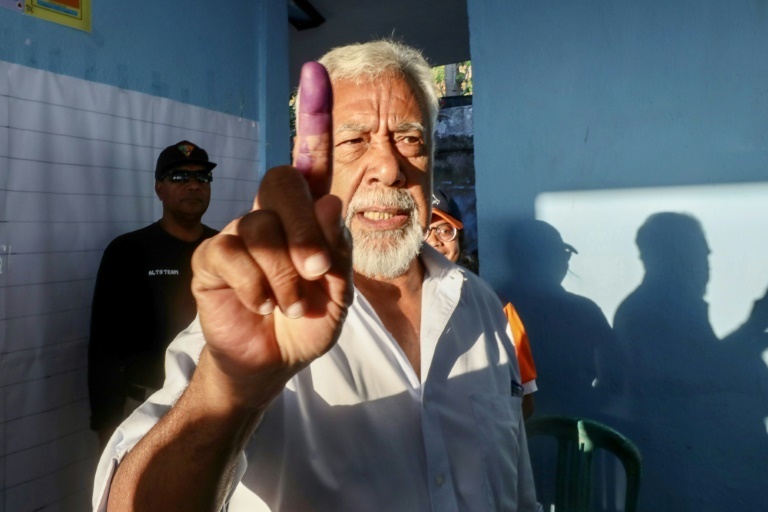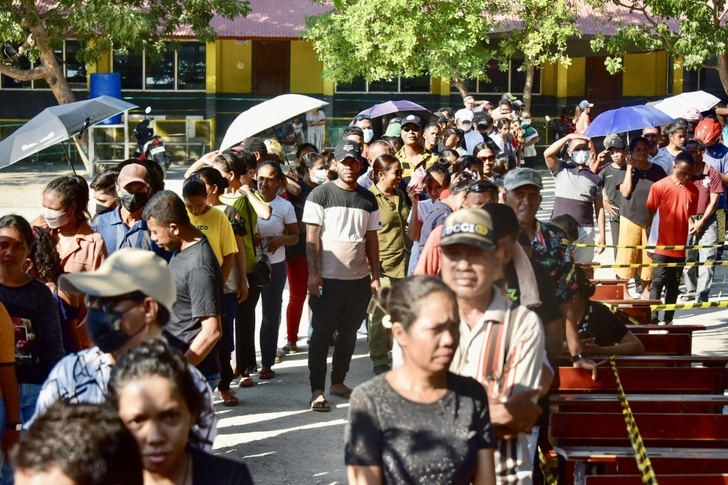Voters in East Timor flocked to polling stations on Sunday to cast their ballots in parliamentary elections, hoping for an end to years of political deadlock in Asia's youngest country.
This is the fifth parliamentary poll since East Timor gained independence from Indonesia in 2002 after a 24-year occupation, with 65 national lawmakers to be elected to a five-year mandate.
Voters formed long queues, carrying umbrellas for shade as they patiently waited for their turn until polling stations closed at 3 pm (0600 GMT).
"All people came to give their voices, because one voice can make a change," 61-year-old Cesar dos Santos de Carvalho told AFP at a polling station in the capital Dili.
"I hope the political party that I chose can put attention on health, education, infrastructure and agriculture, because these are the priority sectors."
Nazario Gregorio Guterres, another voter, stressed the need to improve infrastructure in East Timor, one of the world's poorest countries.
"Just (look at) our capital city, Dili. It's difficult to get electricity and clean water. The party I chose must fix roads, electricity, and provide clean water," said Guterres.
The young democracy, a former Portuguese colony, has 890,000 registered voters, and a total of 17 parties are vying for seats, but the election is expected to mainly be a showdown between the two largest.
The Revolutionary Front for an Independent East Timor, also known as Fretilin, leads the coalition currently in power, while the National Congress for Timorese Reconstruction (CNRT) is hoping to make a comeback.
CNRT is led by Xanana Gusmao, East Timor's first president who was in office until 2007, while Fretilin's leader is former prime minister Mari Alkatiri.
Both are considered independence-era icons and are veterans of East Timor politics, but they have been locked in a bitter feud for decades.
- 'Respect the people' -
Younger voters make up a large part of the electorate in the country of 1.3 million people, 65 percent of whom are under 30.

CNRT won a presidential election last year after capturing 62 percent of the vote in a run-off, with Nobel Peace laureate and Gusmao ally Jose Ramos-Horta assuming the post.
Gusmao is hoping to build on that momentum by taking over the legislature, but he may need to forge an alliance with smaller parties.
"I believe that I will win an absolute (majority) and I'm ready to assume the prime minister's mandate... to build this country better than before", Gusmao told journalists at a polling station.
Alkatiri's Fretilin, meanwhile, has vowed to secure a clear victory and retain its lead in parliament.
"If Fretilin wins for this period, the important thing that we have to do is combat corruption and invest more in education, health and agriculture," Alkatiri said on Sunday after casting his ballot.
As counting started in polling stations, leaders called for peace.
"I have asked all political parties to have the discipline and maturity to respect the people", said President Jose Ramos-Horta.
Some major political events in East Timor have been marred by violence and conflicts in the past.
In 2018, more than a dozen people were injured and several cars torched after clashes between Fretilin and CNRT.
21 years after independence, East Timor is still struggling with poverty, the aftermath of the Covid pandemic and devastating natural disasters, including a 2021 cyclone that killed at least 40 people.
East Timor's budget is heavily dependent on oil revenues, but revenues from existing fossil fuel projects are soon expected to run dry.
The next government will need to decide on allowing the development of the Greater Sunrise project, which aims to tap trillions of cubic feet of natural gas.
str-agn-lgo/qan
© Agence France-Presse
Your content is great. However, if any of the content contained herein violates any rights of yours, including those of copyright, please contact us immediately by e-mail at media[@]kissrpr.com.
Source: Story.KISSPR.com

